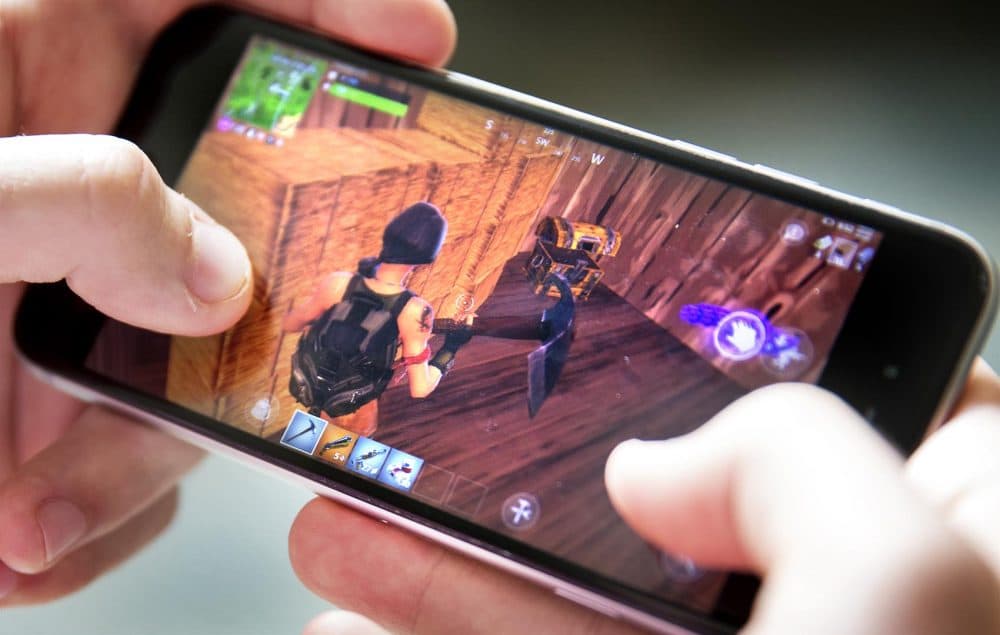Advertisement
How 'Fortnite' Hooks Your Kid, And Why Experts Say You May Not Need To Worry

A Boston-area couple recently sent a desperate email to two dozen fellow parents, seeking “advice, sympathy---anything, really” to help with their teenager’s "Fortnite" habit. After they decided to impose a screen time limit, the angry teen declared they had “ruined not only his social life, but his very life itself.”
Dr. Jonathan Winickoff, a pediatrician at Massachusetts General Hospital for Children, reports recently helping a family "make an action plan for one teen who was so addicted that it was interfering with schoolwork, sleep and life goals." They took advantage of "a natural break during a family vacation this summer,” he says, and the teen was “contracted to not restart when he returns home.”
I’m no stranger to "Fortnite" binges myself. Slouched on my couch, headset on and controller in hand, I’ve spent countless late nights gunning for the No. 1 spot (a “Victory Royale!”) by myself or with friends. Admittedly, I stink at the game. But even as a 25-year-old noob, I often have trouble getting myself to turn it off.
"Fortnite: Battle Royale," a multiplayer, last-man-standing shooter, is the hottest game of the year, expected to rake in $2 billion by the end of the year. It can be played for free on every console and screen, from Xbox to iPhone. Although rated "T for Teen" in the United States, it’s no secret that many of the game's more than 125 million players are kids -- and that many have a hard time stopping.
Concern among parents and experts that "Fortnite" is addicting for children comes at a time of heightened focus on problematic video gaming.
Concern among parents and experts that "Fortnite" is addicting for children comes at a time of heightened focus on problematic video gaming. This summer, the World Health Organization officially labeled “Gaming Disorder” as a mental health condition. It describes the condition as “a pattern of persistent or recurrent gaming behavior,” defined by impaired control over an escalating video game habit, which “takes precedence over other life interests and daily activities.”
On the other hand, the WHO label has provoked skepticism among many psychologists, and some have rebuffed the claim that children are getting hooked on "Fortnite." This month, an article in Education Week even suggested the game may even be good for kids.
So what's driving your kid's "Fortnite" obsession, and is the game worth worrying about? I spoke to three experts: a gaming psychologist, a professor who studies learning in games and a pediatrician who focuses on media's impacts on child health.
Advertisement
Explaining 'Fortnite’s' Draw
If you're not among the 125 million "Fortnite" players, here's how the game goes: As it begins, virtual players mingle in a waiting room, showing off character costumes, called "skins," and "emotes," expressive theatrical gestures and dances that are now widely mimicked. Once 100 players have joined, the game gets into gear, and players are air-dropped onto an island, armed with nothing but a pickax.

On the ground, it’s a mad rush for supplies — shield potions, ammo, building materials and guns — scattered randomly across the expansive map. As time goes on, the island is engulfed by a storm, drawing players closer together and encouraging combat. The game’s goal is simple: be the last one alive.
In essence, every game of "Fortnite: Battle Royale" follows that same, repetitive format. But there are many aspects of battle royale games, and "Fortnite" in particular, that are uniquely appealing psychologically, says Jamie Madigan, a psychologist and author of "Getting Gamers: The Psychology of Video Games and Their Impact on the People who Play Them."
The main factor explaining "Fortnite's" success: "You can play it for free,” he says. Unlike most “AAA games” — a term for titles with massive budgets — "Fortnite" does not cost upwards of $60. Instead, the game makes its money through in-game purchases, which unlock challenges, skins and emotes.
So “there’s an emphasis on progression and customization,” says Madigan, which acts as an “intrinsically motivating reason to keep playing.” He adds that daily challenges — for example, getting a kill with a certain gun — make "Fortnite" especially habit-forming, or, as he puts it, "sticky.”
The game is also chock-full of random rewards, he says, which have been shown to be "the most effective kind for getting people to pay attention, learn behaviors, and repeat them.” Features like glowing treasure chests filled with random loot trigger an evolutionary desire to find patterns in seemingly random events, especially events that we like, he says.
“Every round of the game is just a series of rolls of the dice and pleasant surprises," Madigan says, "and that is something that games long ago learned to capitalize on in terms of our psychology.”
Madigan also points to the “Near Miss Effect,” a concept in gambling research that explains why you don’t need to win "Fortnite" to enjoy the buzz of success. As long as you get close to winning, he says, you feel excitement and satisfaction close to — or even greater than — actually winning an entire match. (This might explain why I keep playing, I suppose, even though I almost never win.)
'Fortnite': A Learning Experience?
In the Education Week article, written by a pair of educators and game design researchers, "Fortnite" is described as “a classic ‘third space’ — a place that is neither home nor school, but where kids can socialize and play beyond the watchful eyes of parents or teachers.”
Eric Klopfer, a professor at MIT and director of the Scheller Teacher Education Program, says he agrees with the article's authors that virtual social spaces like "Fortnite" can be critical for forging social connections in today’s online world. And unlike many video games, he says, "Fortnite" isn’t just a male-oriented space: “My son's squad is him and three girls from his school.”
On occasion, the parent of two also plays "Fortnite" with his son, who turns 15 next week. The game has particular merit, he says, when it comes to teaching "21st century skills,” like collaboration and problem solving
"['Fortnite'] is not necessarily symmetric in the way that people play, particularly if people come in with either different expertise or different interests,” he says. Klopfer likes to build forts and hunker down, while his son is much better at exploring for loot and preventing his father from dying. As they strive to survive together, his son constantly has to think about how best to combine their complementary skillsets. “And that’s a really great learning environment,” he says.
The Mediatrician Weighs In
Dr. Michael Rich, director of the Center on Media and Child Health at Boston Children’s Hospital, has written extensively about "Fortnite" and Gaming Disorder for his blog, Ask the Mediatrician.
“I don’t think there’s anything inherently wrong with 'Fortnite',” he says, referring to it as “virtual 'Hunger Games'.” The game can become an issue, he says, when in the hands of "young people whose executive functions, like impulse control and self-regulation, have not fully developed."
Still, Rich shies away from calling problematic gaming an addiction, for a number of reasons. “Unlike drug use, there’s no physiological addiction here, it really is more about behavioral self-regulation,” he says. “Another reason, quite honestly, is that with the addiction model … the goal in breaking the addiction is abstinence, and these kids cannot abstain from interactive media.”
He says "the idea of limiting screen time to the two hours a day of 'quality educational screens' is really a vestige of the television era that doesn't apply today,” when kids do homework online and use tablets in school.
So when is "Fortnite" a problem? Rich says when it starts intruding on or replacing daily activities — like getting a full night’s sleep, finishing homework, staying physically active, and interacting with real-life friends. "The key for parents is to recognize when their child’s gaming, social media use, pornography use, or information-bingeing ... have resulted in impairment of their academic performance or relationships."
If you feel "Fortnite" truly is usurping your kid's life, there are resources available, says Rich. Boston Children's even has a dedicated clinic for treating those with problematic interactive media use, or PIMU. According to Rich, the team has helped adolescents and children who have self-harmed, or even threatened suicide, after having devices taken away. As to how many "Fortnite"-related incidents they have seen, he says "more than one, unfortunately."
But these cases are exceptions. Rich says gaming can certainly be a part of a "rich and diverse menu of experience" for children, as long as they have reached the mental maturity needed to regulate their video-gaming behavior. But because children mature at different chronological ages, he says relying on age ratings for guidance is a flawed method.
To determine if "Fortnite" is fine for your child, all three experts suggest the same thing: watch and play the game with your kid.